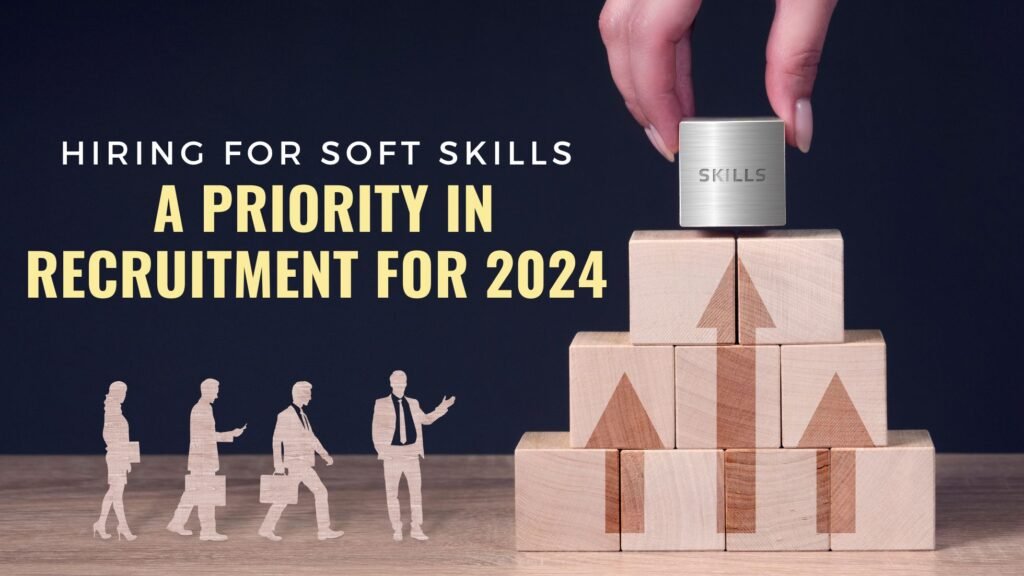As the nature of work continues to evolve, employers are placing more emphasis on what is referred to as soft skills, where these features will be of prime focus in recruitments for 2024. Even though technical skills are key, the adequate expression of communication, teamwork, flexibility, and problem-solving capabilities seem to become as important as the skillfulness itself. With technology and automation at the forefront of every industry, soft skills are turning out to be significant differentiators in a competitive job market.
For the first time in years, there’s a fundamental shift coming to talent acquisition and it’s driven by AI and automation.”
The Rising Significance of Soft Skills
Soft skills are often termed as the “people” or interpersonal skills which, in general, range from emotional intelligence and teamwork to communication and leadership. These skills are used to get along with people at work, but also with customers and stakeholders. The good news is that soft skills are less tangible and more characteristic of personality and character, like hard skills, which may be learned through education or training and are very job-specific.
Rising automation, artificial intelligence, and digital transformations are making it possible for more and more technology-based tasks to be handled by computers. As such, it is much more difficult for these machines to replace soft skills. It has thus led companies to rely on aspects such as empathy, creativity, and adaptability more than ever before in taking initiatives that leverage good leadership with a positive sense of conflict resolution and critical thinking to affect business success factors.
Why Employers are Keen on Soft Skills
1. Adaptability in a Changing Workplace
Technological evolution takes place at the speed of light, and business can only thrive if it has employees adapt to change with new tools, processes, and multiple challenges. A highly adaptable workforce can better handle change, and that is the essence of being flexible in today’s world.
2. Collaboration in Distributed and Hybrid Work
Marr’s other favorite category is a new modality of work-remote and hybrid work. Just as the dynamics of communication and collaboration have changed with remote work, collaboration is now dramatically different in distributed and hybrid work environments. It is about the employee’s ability to be able to work effectively with teams coming from different locations and then time zones. Ability with good communications skills and the ability to build virtual relationships holds a high rank in this increasingly evolving work environment.
3. Emotional Intelligence and Leadership
Organizations are keen to create a heterogeneous and inclusive workplace. As such, EQ has become an extremely important soft skill. By EQ, an employee learns to understand how one should manage one’s emotions and empathize with others. It is particularly true for leadership roles since the ability to motivate, inspire, or lead a group may either make the difference in a company’s success or failure.
4. Problem-Solving and Creativity
In this automation world, one of the most unique human skills remains complex problem-solving abilities, including a little touch of creativity. The employers will be keen on finding employees that can think outside the box while developing different approaches to challenges and solutions for business growth. Curiosity and critical thinking are other soft skills that do not have any alternative.
Top Soft Skills in Demand for 2024
The top soft skills in demand for recruitment in 2024 among preparing organizations include the following:
- Communication: Whether verbal or written, communication is required for most roles, ensuring ideas and information are communicated clearly and effectively.
- There must be adaptability-the ability to thrive in changing environments and adjust to new responsibilities, technologies, or team dynamics.
- Team Work: Good team skills, especially in a virtual or mixed model, will be important to meet the objectives of the collective as well as to preserve a work-positive work environment.
- Emotional Intelligence (EQ): The ability to understand how to regulate one’s own emotions as well as understand and empathize with others is fundamental to relationships and conflict resolution.
- Leadership Ability: Whether at non-managerial levels, leaders demonstrate initiative, make decisions, and can influence others.
- Creative: New approaches with out-of-the-box thinking would result in innovative solutions to complex challenges and stimulate innovation.
- Problem-Solving: The capacity to analyze problems and provide effective solutions applies to most businesses.
How Businesses Are Focusing on Soft Skills
1. Recruitment Overhaul
Increasingly, companies are changing the hiring practices in the light of assessment of soft skills in a much more meaningful manner than ever before while hiring employees. Interviews very often comprise behavioral questions to evaluate how applicants applied soft skills at previous jobs. Situational judgment tests and group exercises have become increasingly indispensable in order to know how applicants collaborate, communicate, and solve problems real-time.
2. Incorporation of Training on Soft Skills
While there are people who are born with high levels of soft skills, most companies are placing money in the form of training programs for employees to develop their soft skills. This now forms one of the cornerstones of professional development. Soft skills training is now becoming part and parcel of a member of staff’s training, and thus, workshops and coaching sessions are dedicated to the areas of communication, emotional intelligence, and leadership.
3. Measuring Soft Skills Performance
Whereas the classic performance metrics could include sales figures or the completion rates of projects, in addition to that, soft skills evaluations are added. Companies make estimates using 360-degree feedback or peer reviews of employees’ ability to collaborate, communicate, and show leadership. In this change, not only does it enforce a better-rounded viewpoint of employee performance, but it also enforces the importance of soft skills within the organization.
The Future of Work: A Balance of Soft and Hard Skills
Whereas technical know-how and industry knowledge are still highly relevant, soft skills are no longer an “optional nice-to-haves” but a critical capability that has a great impact on sustainable success. Employees equipped with both technical know-how and superb interpersonal skills will most likely be successful in any hiring and in roles.
With a more complex economy and the globalization that’s becoming more and more complex, it will be vital that firms are connected to others, lead with empathy, and adapt to change. Organizations that will develop a priority of hiring and developing employees with strong soft skills will be better prepared to innovate and solve problems in the future.
Summing Up!
Recruiting for 2024 focuses on soft skills in an effort to understand employees of the greatest value: technical experts and human-centered ability. Industries reshaped by automation will only continue to demand a constant stream of communication, true leadership, emotional intelligence, and resilience.
This translates directly for job seekers as being an investment in the development of soft skills, that is a game-changer. Again, whether through reflection, formal training, or real-world experience, soft skills will become the most vital area for career growth in the next few years. Similarly, focusing on recruitment through soft skills for employers should mean not only bringing a highly dynamic and adaptable workforce but also a more inclusive, innovative, and successful organization.






Leave a Reply